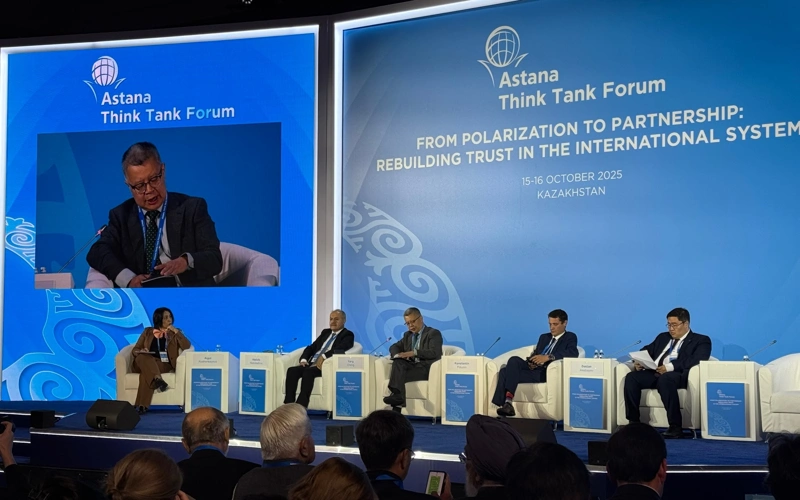When giants clash, balance comes from the middle - David Aptsiauri
The global system is undergoing profound transformation, with a growing role for so-called “middle powers” seeking to restore balance amid disorganized multilateralism, said David Aptsiauri, Ambassador Extraordinary and Plenipotentiary, Professor at Beijing University of International Business and Economics and Georgian International University, during the Astana Think Tank Forum 2025, Kazinform News Agency reports.

Speaking at a session on the future dynamics of Asia, the Georgian diplomat and academic emphasized that the world has entered an era of rapid structural shifts - one in which traditional distinctions between developed and developing nations are blurring.
“Former developing countries have become double countries today. The best example is China — a nation that once relied on others for support, now helping Europe during times of crisis,” he noted.
The diplomat emphasized that global governance mechanisms such as the UN Security Council and the G20 no longer adequately respond to current geopolitical realities, resulting in what he called a fragmented or “disorganized multilateral” environment. In this context, a new group of countries, including middle powers like Türkiye, Azerbaijan, is taking a more active role in international cooperation to restore balance and promote global stability.
“The world is no longer divided into clear categories of developed and developing nations. We are witnessing the emergence of a flexible, interconnected network of states that act pragmatically to maintain equilibrium,” Aptsiauri said.
According to Aptsiauri, the composition of these countries includes regional and global actors united by pragmatic interests and an effort to minimize the risks of polarization. Their growing participation in global economic and political projects strengthens their influence on the international agenda.
He stressed that modernization and investment require long-term strategic thinking supported by analytical expertise. Sustainable progress, he said, depends on the joint efforts of governments, businesses, and expert communities.
Aptsiauri referred to economic thought arguing that capitalism, while historically a driver of democracy and growth, now faces limitations that require a new balance between markets, governance, and social responsibility.
He added that middle powers could play a key role in maintaining this balance, serving as a bridge between major global blocs. At the same time, he underlined the need to strengthen management capacities, logistics, and technological infrastructure to ensure effective regional and international cooperation.
Earlier, Kazinform News Agency reported that Eric Rudenshiold highlighted Central Asia’s “pragmatic sovereignty” as an example of how middle powers shape the global order through multi-vector diplomacy.
